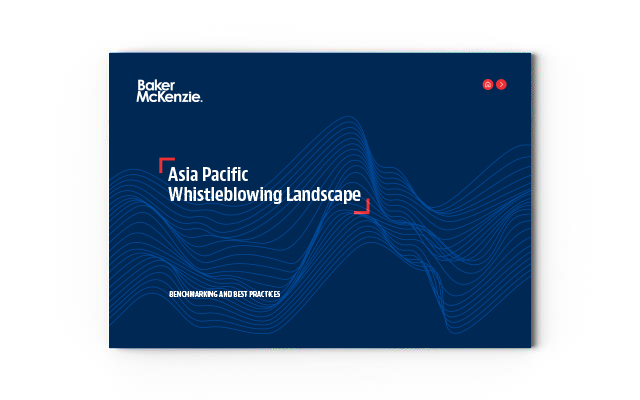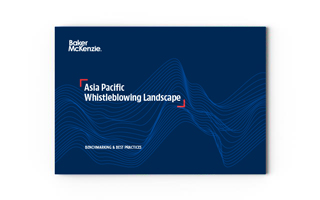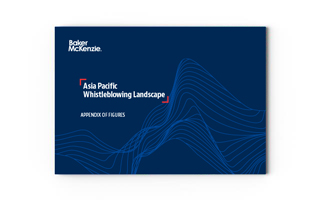About the campaign
Addressing whistleblower complaints has quickly become front and center for companies in Asia Pacific. Research shows that it is increasingly apparent that whistleblowing programs need to adapt and evolve with the legal and regulatory landscape, and it is vital that management implements a regular review of those programs.
Leaders and decision makers have the power to take ownership of — and invest resources in — their organization’s whistleblowing program to give it every chance of success. Where does your business stand compared with others in the sector or against key jurisdictions in the region?
Explore Baker McKenzie’s custom research, conducted in collaboration with Acuris Studios, based on responses from 523 senior executives from companies in Asia Pacific.

Explore the Main Themes
The Rise of Whistleblowing
Across the region, 41% of business leaders report an increase in whistleblower reports over the past year — and in some countries and industries, the numbers are much higher. A range of factors underpin this trend, from new regulations to increased media attention and in some countries incentives for whistleblowers, but the direction of travel is clear.
What’s Top of Mind?
- 72% have received complaints about bullying, discrimination and/or harassment
- 62% have received complaints about breaches of internal policies
- 55% have received complaints about workplace health and safety concerns
These results suggest companies are facing pressure to take responsibility for investigating and remediating transgressions across a broad range of issues.
By Jurisdiction
Variation exists across the region. Australian respondents reported the lowest levels of increases in the number of reports received over the last year, at only 17%. By contrast, 74% of Mainland Chinese respondents report higher whistleblower cases with 61% of those in Hong Kong saying the same.
By Sector
Just under half (45%) of companies in the highly regulated industries — Financial Institutions (FI), Healthcare & Life Sciences (HLS) and Energy, Mining and Infrastructure (EMI) — saw an increase in whistleblowing reports over the past year. By contrast, only 35% of Consumer Goods and Retail (CGR) companies saw an increase in reports.
Download the full report and explore more in Section 1
ESG in Focus
The exponential growth in ESG value and recognition has brought increased pressure on companies from regulators, investors, consumers and employees. 33% of companies are receiving complaints about environmental, social and governance (ESG) issues and this figure is expected to rise.
Companies are now moving to include all aspects of ESG within their whistleblowing program. More than half of respondents (60%) say their whistleblower reporting program now covers breaches of their ESG or sustainability policy.
Whistleblowing and ESG are now hand in hand
We cannot continue with the ESG program unless we know about any discrepancies. Preparing a report helps us cater to the latest demands and ensure we improve ESG standards.
— Respondent from Hong Kong
Download the full report and explore more in Section 2
Benchmarks and Challenges
Companies around the region seem to understand the importance of having a formal whistleblowing program in place — only 8% of our respondents did not have a formal written whistleblower policy. However, there are still some variations as to how these programs look and how well they are implemented.
Training
Training is provided by 86% of companies at the point of an employee’s induction. However, this figure drops significantly for companies which provide regular/periodic training (45%).
Dedicated Resources
Most companies (83%) provide dedicated resources to follow up on whistleblower reported issues, but the landscape varies. While Australian respondents reported the highest levels of dedicated resources within the organization (67%), Japan reported the lowest level of dedicated resources outside the organization (41%).
Protecting Confidentiality
Over two-thirds of all respondents (68%) ensure that paper and electronic documents relating to whistleblowing reports and investigations are securely stored. More than half of all respondents (57%) have procedures in place to remind those involved in any investigation of the confidentiality requirements.
Opinions on Financial Incentives
Half of respondents believe financial incentives would encourage people to report legitimate misconduct they otherwise might not but 83% worry that such incentives would give rise to the possibility of false claims.
Download the full report and explore more in Section 3
Market Spotlights
Australia

The broader range of conduct which can be reported and receive protection as well as the expanded scope of persons eligible for protection under the revised legislation means that it is imperative for companies to be on top of the new requirements.
— Michael Michalandos, Partner, Sydney
Respondents believe Australia’s reforms have provided whistleblowers with a supportive climate to report issues with 87% believing the 2019 reforms have encouraged employees to report illegal activities and misconduct. This includes 45% who think a willingness to bring complaints has greatly increased.
Key Stats
59% of Australian respondents reported that they had encountered difficulty in establishing whether the whistleblowing laws applied to a particular report.
22% of respondents identified an issue with the complaint not including sufficient information for the company to take a view on whether it is a protected.
Download the full report and explore more in Section 4
Mainland China

These interim measures are part of a concerted effort to reduce misconduct in the market, and particularly in those industries which have traditionally been difficult to monitor, but which have significant interactions with the public (e.g., healthcare and food and beverage industry). Through introducing financial incentives and whistleblower protections, the aim is to encourage those who are aware of serious misconduct to come forward.
— Vivian Wu, Partner, Beijing, FenXun Partners *
The past few years have seen some significant development in whistleblowing programs in Mainland China. A reliable whistleblowing program is an integral part of a robust compliance program, as it allows for companies to review and address misconduct it might not otherwise see.
This increase in prominence and use of whistleblowing programs is reflected in our survey results. A significant majority of companies recorded an increase in the number of whistleblowing complaints compared to the previous year. Only 9% of companies responded that they had a decrease in the number of complaints stating that the number of complaints stayed the same.
There is mixed sentiment amongst corporates as to whether the growth of whistleblower programs is a positive development. For those who receive whistleblowing complaints in Mainland China, almost three quarters (72%) consider that their organization has received reports that are vexatious or prompted by self-preservation. This is 30% higher than the average of respondents surveyed, which sits at 42%.
In 2019, Mainland China called for governmental agencies to establish and promote whistleblowing programs. In recent years, various government agencies have issued specific rules on whistleblowing programs in their respective areas. As noted above, the MOF and SAMR have recently introduced the “Interim Measures for Rewards for Whistleblower Reports of Major Violations in the Field of Market Regulation.” These provide for financial rewards of up to RMB 1 million for whistleblowers.
Download the full report and explore more in Section 5
* FenXun established a joint operation office with Baker McKenzie in China as Baker McKenzie FenXun, which was approved by the Shanghai Justice Bureau in 2015.
Japan

In Japan, amendments have been proposed to the Whistleblower Protection Act which include a mandatory obligation for companies of a certain size to establish a whistleblowing system with the aim of ensuring the protection of whistleblowers.
Survey respondents indicate several areas where amendments have taken operational effect in terms of confidentiality, job protection and formalized support.
| Consent Language88% of Japanese respondents indicate that consent language is included in the whistleblowing reporting system in order to maintain the confidentiality of a whistleblower’s identity.This is 18% higher than the average across respondents from all jurisdictions surveyed. | Job ProtectionOver the past three years 73% of Japanese respondents indicate that the organization has arranged for alternative employment arrangements (e.g. change of role at the same level or working from another location etc.) in order to protect whistleblowers from detriment, victimization or retaliation. |
Focus on ESG
Growing attention to ESG and sustainability issues sees 40% of Japanese respondents indicate that whistleblowing complaints have included a breach relating to ESG issues.
82% of Japanese respondents indicate that their whistleblowing reporting program covers breaches of their ESG or sustainability policy, as compared to a 60% average across all respondents.
60% of Japanese respondents say their company prepares a report on their ESG programs, as compared to a 50% average across all respondents.
Download the full report and explore more in Section 6










